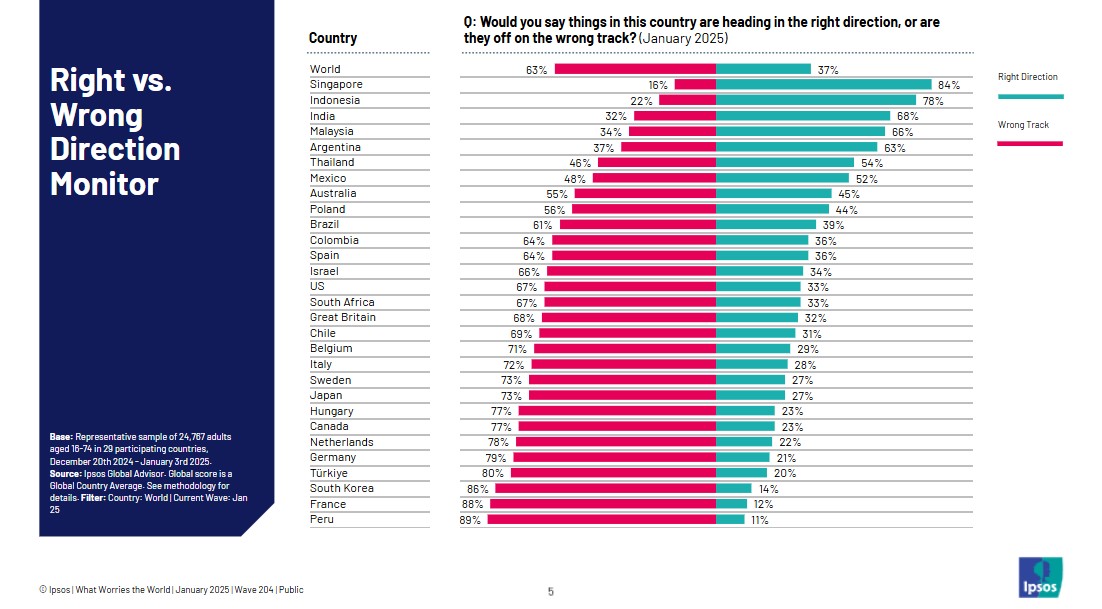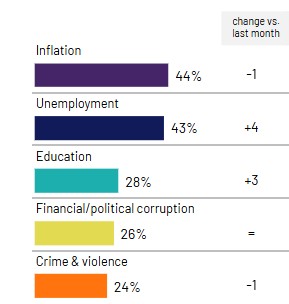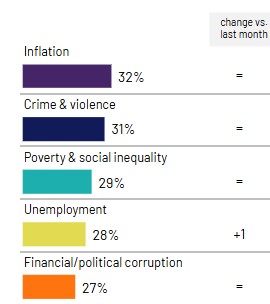

Citizens back India’s growth story, though remain concerned about inflation and unemployment: Ipsos What Worries the World global survey
Majority of urban Indians continue to be bullish about India’s growth story in the new year, believing India is headed in the right direction. Interestingly, India continued to be a front runner, ranked third on optimism, while citizens of 22 of 30 markets were seen to be pessimistic about the future. These are the findings of the Ipsos What Worries the World global monthly survey, that highlights the key socio-economic issues worrying citizens across 30 global markets and also gauges optimism levels of citizens
Though niggling issues of inflation and unemployment continued to beset citizens, with worry levels increasing around unemployment, though inflation saw a minor dip over the previous month.

“India’s growth story is a saga of consistency, resilience and optimism in the face of odds. Despite the tough global macro conditions, accentuated by the wars and global economic slowdown and its dreadful impact on the local economy, Indians are scripting their own growth story with their never say die attitude. Further, tax breaks bonanza for the middle class in the Budget on Feb 1st, should bring relief to the masses and help them deal with inflationary conditions,” stated Amit Adarkar, CEO, Ipsos India.
The survey revealed world worries and local worries consisting of at least 4 of 5 similar issues, emanating from the crushing impact of the pandemic, prolonged wars and slowing down of the global economy and the high cost of living, jobs cuts coupled with freeze in hiring/ right sizing by a few large of global companies.
India’s worries Global worries


Sanskrati Sail, head of Human Resource Development (HRD), Ipsos India said, "Worry around unemployment shows job scarcity in the market and demand continuing to far outstrip supply. Skilling, re-skilling, upskilling and being AI savvy will lead to greater efficiencies and availability of new job prospects. Worry around education is also linked to career guidance and being job ready, keeping pace with changing times."
Methodology
The 30 country survey was conducted between December 20th 2024 and January 3rd 2025 via the Ipsos Online Panel system among 24,767 adults aged 18-74 in Canada, Israel, Malaysia, South Africa, Türkiye and the United States, 20-74 in Indonesia and Thailand, 21-74 in Singapore, and 16-74 in all other nations. The “Global Country Average” reflects the average result for all the countries where the survey was conducted. It has not been adjusted to the population size of each country and is not intended to suggest a total result." The sample consists of approximately 1000+ individuals in each of Australia, Belgium, Brazil, Canada, France, Germany, Great Britain, Italy, Japan, Spain, Sweden, and the US, and approximately 500+ individuals in each of Argentina, Chile, Colombia, Hungary, Indonesia, Israel, Malaysia, Mexico, the Netherlands, Peru, Poland, Singapore, South Africa, South Korea, Thailand and Türkiye. The sample in India consists of approximately 2,200 individuals, of whom approximately 1,800 were interviewed faceto-face and 400 were interviewed online. The samples in Argentina, Australia, Belgium, Canada, France, Germany, Great Britain, Hungary, Italy, Japan, the Netherlands, Poland, South Korea, Spain, Sweden, and the US can be taken as representative of these countries’ general adult population under the age of 75. The samples in Brazil, Chile, Colombia, India, Indonesia, Malaysia, Mexico, Peru, Singapore, South Africa, Thailand and Türkiye are more urban, more educated, and/or more affluent than the general population. The survey results for these markets should be viewed as reflecting the views of the more “connected” segment of these populations. India’s sample represents a large subset of its urban population — social economic classes A, B and C in metros and tier 1-3 town classes across all four zones. Weighting has been employed to balance demographics and ensure that the sample’s composition reflects that of the adult population according to the most recent census data. The precision of Ipsos online polls are calculated using a credibility interval with a poll of 1,000 accurate to +/- 3.5 percentage points and of 500 accurate to +/- 5.0 percentage points. For more information on the Ipsos use of credibility intervals, please visit the Ipsos website. Where results do not sum to 100 or the ‘difference’ appears to be +/-1 more/less than the actual, this may be due to rounding, multiple responses, or the exclusion of don't knows or not stated responses The publication of these findings abides by local rules and regulations.
The sample in India consists of approximately 2,200 individuals, of whom 1,800 were interviewed face-to-face and 400 were interviewed online using the IndiaBus platform. |



